初中英语语法知识—动词时态的技巧及练习题(3)
初中必备英语动词的时态技巧全解及练习题(含答案)
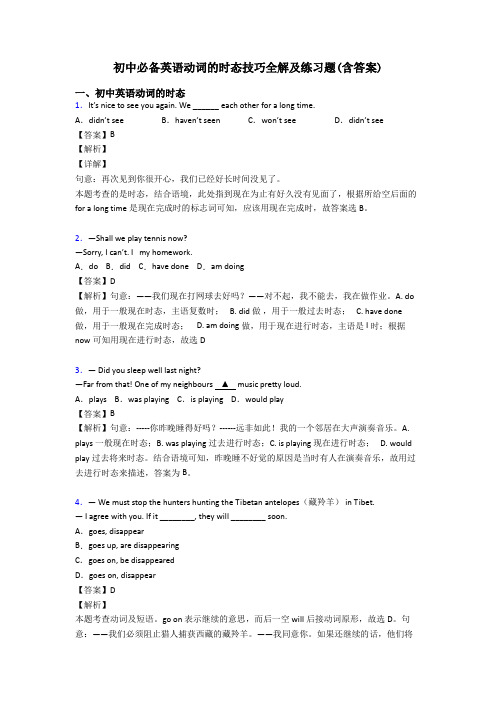
初中必备英语动词的时态技巧全解及练习题(含答案)一、初中英语动词的时态1.It’s nice to see you again. We ______ each other for a long time.A.didn’t see B.haven’t seen C.won’t see D.didn’t see【答案】B【解析】【详解】句意:再次见到你很开心,我们已经好长时间没见了。
本题考查的是时态,结合语境,此处指到现在为止有好久没有见面了,根据所给空后面的for a long time是现在完成时的标志词可知,应该用现在完成时,故答案选B。
2.—Shall we play tennis now?—Sorry, I can’t. I my homework.A.do B.did C.have done D.am doing【答案】D【解析】句意:——我们现在打网球去好吗?——对不起,我不能去,我在做作业。
A. do 做,用于一般现在时态,主语复数时; B. did做,用于一般过去时态; C. have done 做,用于一般现在完成时态; D. am doing做,用于现在进行时态,主语是I时;根据now可知用现在进行时态,故选D3.— Did you sleep well last night?—Far from that! One of my neighbours ▲ music pretty loud.A.plays B.was playing C.is playing D.would play【答案】B【解析】句意:-----你昨晚睡得好吗?------远非如此!我的一个邻居在大声演奏音乐。
A. plays一般现在时态;B. was playing 过去进行时态;C. is playing 现在进行时态; D. would play过去将来时态。
结合语境可知,昨晚睡不好觉的原因是当时有人在演奏音乐,故用过去进行时态来描述,答案为B。
【中考英语考点详解+专项训练】专题12 动词时态(三) (原卷版)
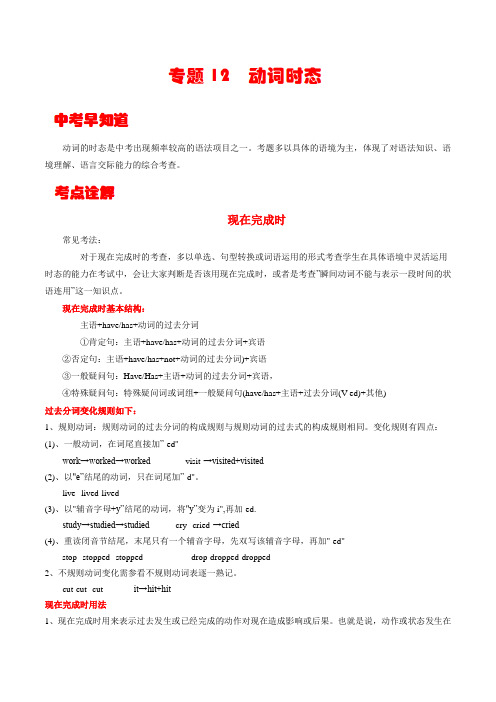
动词的时态是中考出现频率较高的语法项目之一。
考题多以具体的语境为主,体现了对语法知识、语境理解、语言交际能力的综合考查。
现在完成时常见考法:对于现在完成时的考查,多以单选、句型转换或词语运用的形式考查学生在具体语境中灵活运用时态的能力在考试中,会让大家判断是否该用现在完成时,或者是考查”瞬间动词不能与表示一段时间的状语连用”这一知识点。
现在完成时基本结构:主语+have/has+动词的过去分词①肯定句:主语+have/has+动词的过去分词+宾语②否定句:主语+have/has+not+动词的过去分词)+宾语③一般疑问句:Have/Has+主语+动词的过去分词+宾语,④特殊疑问句:特殊疑问词或词组+一般疑问句(have/has+主语+过去分词(V-ed)+其他)过去分词变化规则如下:1、规则动词:规则动词的过去分词的构成规则与规则动词的过去式的构成规则相同。
变化规则有四点:(1)、一般动词,在词尾直接加”-ed"work→worked→worked visit-→visited+visited(2)、以"e”结尾的动词,只在词尾加”-d"。
live--lived-lived(3)、以"辅音字母+y”结尾的动词,将"y”变为i",再加-ed.study→studied→studied cry--cried-→cried(4)、重读闭音节结尾,末尾只有一个辅音字母,先双写该辅音字母,再加"-ed"stop--stopped--stopped drop-dropped-dropped2、不规则动词变化需参看不规则动词表逐一熟记。
cut-cut--cut it→hit+hit现在完成时用法1、现在完成时用来表示过去发生或已经完成的动作对现在造成影响或后果。
也就是说,动作或状态发生在过去但它的影响现在还存在,强调的是现在。
I have already posted the photo. 我已经把照片寄走了。
初中英语动词的时态答题技巧及练习题(含答案)含解析
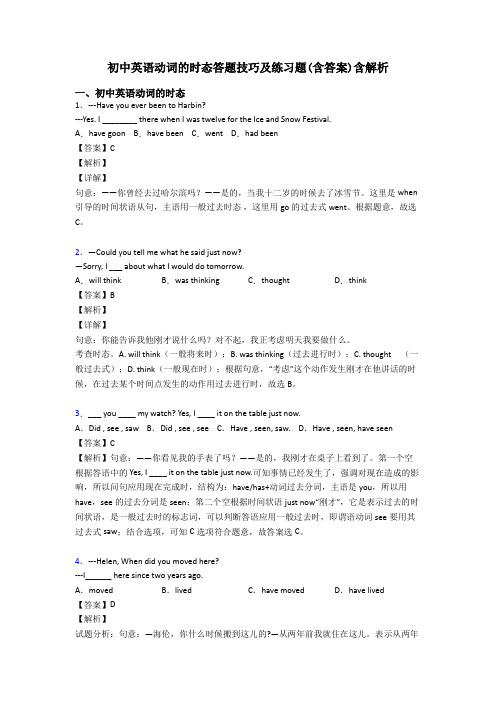
初中英语动词的时态答题技巧及练习题(含答案)含解析一、初中英语动词的时态1.---Have you ever been to Harbin?---Yes. I ________ there when I was twelve for the Ice and Snow Festival.A.have goon B.have been C.went D.had been【答案】C【解析】【详解】句意:——你曾经去过哈尔滨吗?——是的,当我十二岁的时候去了冰雪节。
这里是when 引导的时间状语从句,主语用一般过去时态,这里用go的过去式went。
根据题意,故选C。
2.—Could you tell me what he said just now?—Sorry, I ___ about what I would do tomorrow.A.will think B.was thinking C.thought D.think【答案】B【解析】【详解】句意:你能告诉我他刚才说什么吗?对不起,我正考虑明天我要做什么。
考查时态。
A. will think(一般将来时);B. was thinking(过去进行时);C. thought (一般过去式);D. think(一般现在时);根据句意,“考虑”这个动作发生刚才在他讲话的时候,在过去某个时间点发生的动作用过去进行时,故选B。
3.___ you ____ my watch? Yes, I ____ it on the table just now.A.Did , see , saw B.Did , see , see C.Have , seen, saw. D.Have , seen, have seen【答案】C【解析】句意:——你看见我的手表了吗?——是的,我刚才在桌子上看到了。
第一个空根据答语中的Yes, I ____ it on the table just now.可知事情已经发生了,强调对现在造成的影响,所以问句应用现在完成时,结构为:have/has+动词过去分词,主语是you,所以用have,see的过去分词是seen;第二个空根据时间状语just now“刚才”,它是表示过去的时间状语,是一般过去时的标志词,可以判断答语应用一般过去时,即谓语动词see要用其过去式saw;结合选项,可知C选项符合题意,故答案选C。
(英语)初中英语动词的时态技巧和方法完整版及练习题及解析

据后面的句子判断,对于坐在身边表示介意,故答案为
C。
13. —Will Sally come here tomorrow?
— I don ’ t know if she_______ here tomorrow. If she _______ here, I will tell you.
A. comes; comes
B. will come; comes C. comes; will come D. will come; will come
【答案】 B
【解析】
【详解】
句意: -Sally 明天会到这儿来吗? -我不知道她明天是否来这儿,如果她来的话,我会告诉
你的。 comes 来,动词的第三人称单数形式; will come 将会来,一般将来时态。根据句意
明年,用于一般将来时,可排除 C 项。根据句意结构和语境,可知选 B。
7.---Helen, When did you moved here? ---I______ here since two years ago.
A. moved 【答案】 D 【解析】
B. lived
C. have moved
D. have lived
【解析】句意:你介意我坐在你旁边吗,先生?
——对不起,我确实介意,我习惯了独自
坐着欣赏音乐。 mind doing sth.介意做某事, doing 前面可以用形容词性物主代词或代词的
宾格,首先排除 B,D; used to do 过去常常做某事, be used to doing sth.习惯于做某事,根
(英语)初中英语动词的时态技巧和方法完整版及练习题及解析
一、初中英语动词的时态
1.Alice, together with her classmates punished for breaking the school rules last week.
【英语】初中英语动词的时态常见题型及答题技巧及练习题(含答案)含解析
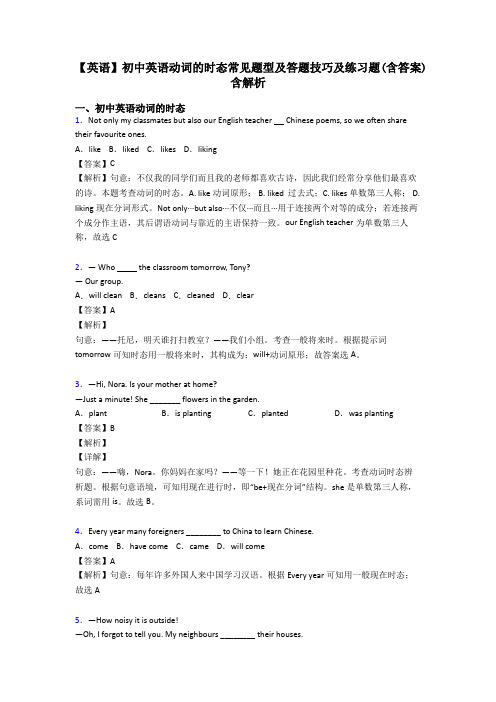
【英语】初中英语动词的时态常见题型及答题技巧及练习题(含答案)含解析一、初中英语动词的时态1.Not only my classmates but also our English teacher Chinese poems, so we often share their favourite ones.A.like B.liked C.likes D.liking【答案】C【解析】句意:不仅我的同学们而且我的老师都喜欢古诗,因此我们经常分享他们最喜欢的诗。
本题考查动词的时态。
A. like动词原形; B. liked 过去式;C. likes 单数第三人称; D. liking现在分词形式。
Not only···but also···不仅···而且···用于连接两个对等的成分;若连接两个成分作主语,其后谓语动词与靠近的主语保持一致。
our English teacher为单数第三人称,故选C2.— Who the classroom tomorrow, Tony?— Our group.A.will clean B.cleans C.cleaned D.clear【答案】A【解析】句意:——托尼,明天谁打扫教室?——我们小组。
考查一般将来时。
根据提示词tomorrow可知时态用一般将来时,其构成为:will+动词原形;故答案选A。
3.—Hi, Nora. Is your mother at home?—Just a minute! She _______ flowers in the garden.A.plant B.is planting C.planted D.was planting【答案】B【解析】【详解】句意:——嗨,Nora。
你妈妈在家吗?——等一下!她正在花园里种花。
(英语)初中英语动词的时态常见题型及答题技巧及练习题(含答案)
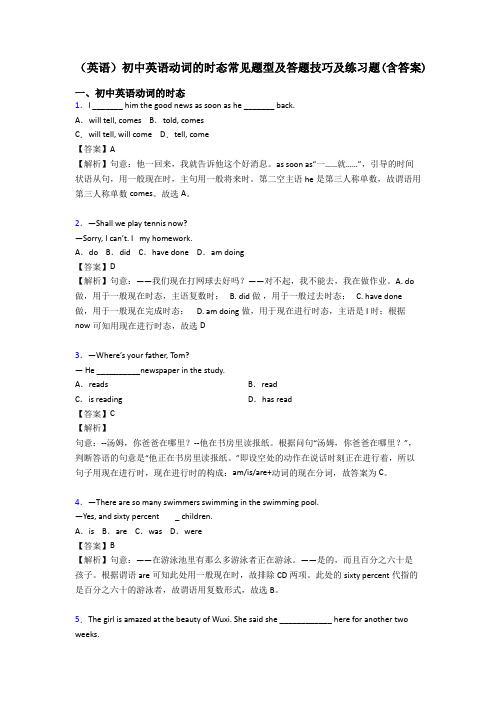
(英语)初中英语动词的时态常见题型及答题技巧及练习题(含答案)一、初中英语动词的时态1.I _______ him the good news as soon as he _______ back.A.will tell, comes B.told, comesC.will tell, will come D.tell, come【答案】A【解析】句意:他一回来,我就告诉他这个好消息。
as soon as“一……就……”,引导的时间状语从句,用一般现在时,主句用一般将来时。
第二空主语he是第三人称单数,故谓语用第三人称单数comes。
故选A。
2.—Shall we play tennis now?—Sorry, I can’t. I my homework.A.do B.did C.have done D.am doing【答案】D【解析】句意:——我们现在打网球去好吗?——对不起,我不能去,我在做作业。
A. do 做,用于一般现在时态,主语复数时; B. did做,用于一般过去时态; C. have done做,用于一般现在完成时态; D. am doing做,用于现在进行时态,主语是I时;根据now可知用现在进行时态,故选D3.—Where’s your father, Tom?— He __________newspaper in the study.A.reads B.readC.is reading D.has read【答案】C【解析】句意:--汤姆,你爸爸在哪里?--他在书房里读报纸。
根据问句“汤姆,你爸爸在哪里?”,判断答语的句意是“他正在书房里读报纸。
”即设空处的动作在说话时刻正在进行着,所以句子用现在进行时,现在进行时的构成:am/is/are+动词的现在分词,故答案为C。
4.—There are so many swimmers swimming in the swimming pool.—Yes, and sixty percent _ children.A.is B.are C.was D.were【答案】B【解析】句意:——在游泳池里有那么多游泳者正在游泳。
初中必备英语动词的时态技巧全解及练习题(含答案)含解析

初中必备英语动词的时态技巧全解及练习题(含答案)含解析一、初中英语动词的时态1.—I don’t know when _________tomorrow. —I will call you as soon as he _________. A.will he come…arrives B.he will come…arrives C.he will come…will arrive【答案】B【解析】句意:我不知道他明天什么时候会来。
他一来我就会给你打电话的。
前一个句子是宾语从句,语序为陈述句的语序,根据tomorrow判断,时态为一般将来时态,排除A;第二个句子为as soon as引导的时间状语从句,主句为一般将来时,时间状语从句为一般现在时,故选B 。
2.—Shall we play tennis now?—Sorry, I can’t. I my homework.A.do B.did C.have done D.am doing【答案】D【解析】句意:——我们现在打网球去好吗?——对不起,我不能去,我在做作业。
A. do 做,用于一般现在时态,主语复数时; B. did做,用于一般过去时态; C. have done 做,用于一般现在完成时态; D. am doing做,用于现在进行时态,主语是I时;根据now可知用现在进行时态,故选D3.―Tom! I you 40 times that I'll beat you if you don't leave that apple jam alone.―Sorry, Aunt!A.tell B.told C.have told D.am telling【答案】C【解析】句意:Tom!我已经警告过你40次,如果你不留下那个苹果酱,我就揍你。
对不起,姑姑!本题考查动词tell(告诉)的时态。
A. tell 动词原形;B. told 一般过去时;C. have told 现在完成时;D. am telling现在进行时。
初中英语语法专项复习英语动词时态和语态讲解和练习题
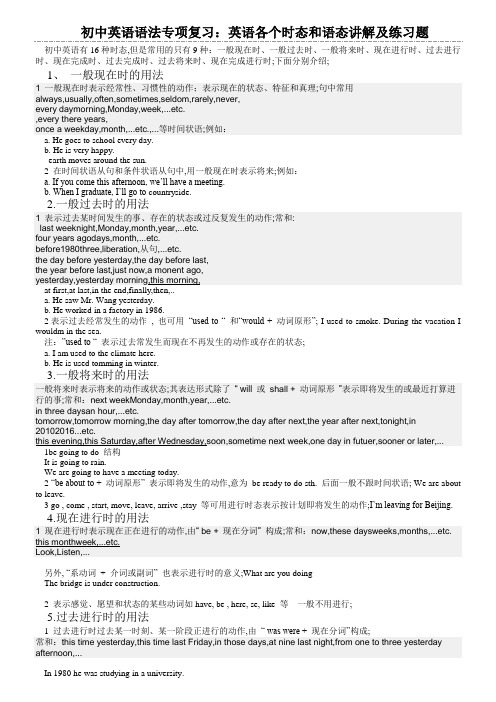
初中英语语法专项复习:英语各个时态和语态讲解及练习题初中英语有16种时态,但是常用的只有9种:一般现在时、一般过去时、一般将来时、现在进行时、过去进行时、现在完成时、过去完成时、过去将来时、现在完成进行时;下面分别介绍;1、一般现在时的用法1 一般现在时表示经常性、习惯性的动作;表示现在的状态、特征和真理;句中常用always,usually,often,sometimes,seldom,rarely,never,every daymorning,Monday,week,...etc.,every there years,once a weekday,month,...etc.,...等时间状语;例如:a. He goes to school every day.b. He is very happy.earth moves around the sun.2 在时间状语从句和条件状语从句中,用一般现在时表示将来;例如:a. If you come this afternoon, we’ll have a meeting.b. When I graduate, I’ll go to countryside.2.一般过去时的用法1 表示过去某时间发生的事、存在的状态或过反复发生的动作;常和:last weeknight,Monday,month,year,...etc.four years agodays,month,...etc.before1980three,liberation,从句,...etc.the day before yesterday,the day before last,the year before last,just now,a monent ago,yesterday,yesterday morning,this morning,at first,at last,in the end,finally,then,..a. He saw Mr. Wang yesterday.b. He worked in a factory in 1986.2表示过去经常发生的动作, 也可用“used to “ 和“would + 动词原形”; I used to smoke. During the vacation I wouldm in the sea.注:”used to “ 表示过去常发生而现在不再发生的动作或存在的状态;a. I am used to the climate here.b. He is used tomming in winter.3.一般将来时的用法一般将来时表示将来的动作或状态;其表达形式除了“ will 或shall + 动词原形”表示即将发生的或最近打算进行的事;常和:next weekMonday,month,year,...etc.in three daysan hour,...etc.tomorrow,tomorrow morning,the day after tomorrow,the day after next,the year after next,tonight,in 20102016...etc.this evening,this Saturday,after Wednesday,soon,sometime next week,one day in futuer,sooner or later,...1be going to do 结构It is going to rain.We are going to have a meeting today.2 “be about to + 动词原形” 表示即将发生的动作,意为be ready to do sth. 后面一般不跟时间状语; We are about to leave.3 go , come , start, move, leave, arrive ,stay 等可用进行时态表示按计划即将发生的动作;I’m leaving for Beijing.4.现在进行时的用法1 现在进行时表示现在正在进行的动作,由“ be + 现在分词” 构成;常和:now,these daysweeks,months,...etc. this monthweek,...etc.Look,Listen,...另外, “系动词+ 介词或副词” 也表示进行时的意义;What are you doingThe bridge is under construction.2 表示感觉、愿望和状态的某些动词如have, be , here, se, like 等一般不用进行;5.过去进行时的用法1 过去进行时过去某一时刻、某一阶段正进行的动作,由“ was were + 现在分词”构成;常和:this time yesterday,this time last Friday,in those days,at nine last night,from one to three yesterday afternoon,...In 1980 he was studying in a university.He was reading a novel when I came in.6.现在完成时的用法现在完成时由“have/has + 过去分词.其使用有两种情况:1 现在完成时所表示的动作在说话之前已完成,但对现在有影响;句中没有具体时间状语;常和:just,alreadly,yet,never,ever,now,before,this week,today,these days,once,twice,three times,...He has gone to Fuzhou.He has been to Fuzhou.2 现在完成时所表示的动作开始于过去,持续到现在,也许还会持续下去常用for 和since表示一段时间的状语或since then1949,last Monday,two o'clock,从句...,etc.,ever since then,for three daysa long time,two hours,...etc.so far , now, today, this wek month, year 等表示包括现在内的状语;He has studied English for 5 years.He has studied English since 1985.Now I have finished the work..注意:表示短暂时间动作的词如come, go , die, marry, buy 等的完成时不能与for, since 等表示一般时间的词连用;正确:I have bought the book already.错误:I have bought the book for two years.改:I have had the bookl for two years.7.过去完成时的用法1 过去完成时由“had + 过去分词”构成;过去完成时的动作表示过去某一时刻或某一时刻或某一动作之前完成的动作或状态;句中常用by then1977,yesterday,eight last night,the time we got there,...etc.by the end of last termweek,year,month,...etc..by, before, until, when 等词引导的时间状语;By the end of last year we had built five new houses.I had learnt 5000 words before I entered the university.2过去完成时的动词还可表示过去某一时刻之前发生的动作或状态持续到过去某个时间或持续下去;Before he slept, he had worked for 12 hours.8.过去将来时的用法过去将来时表示从过去的某个时间看来将要发生的动作或存在的状态;过去将来时由“should 或would + 动词原形” 构成;第一人称用should, 其他人称用would. ;常和:They were sure that they would succeed.二动词语态1.当句子的主语是动作的执行者时, 谓语的形式叫主动语态;句子的主语是动作承受者时,谓语的形式叫被动作语态;被动语态由助动词be + 过去分词构成,时态通过be 表现出来;1 一般现在时:You are required to do this.2 一般过去时:The story was told by her.3 一般将来时:The problem will be discussed tomorrow.4 现在进行时:The road is being widened.5 过去进行时:The new tool was being made.6 现在完成时:The novel has been read.7 过去完成时:He said that the work had been finished.8 过去将来时:He said that the trees would be planted soon.2. 一些特殊的被动结构1 带情态动词的被动结构:The problem must be solved soon.2 带不定式的被动结构:The room is going to be painted.The homework needs to be done with care.3 短语动词的被动:a.不及物动词+介词:若这类短语动词是及物性的,则可用于被动语态中,如:laugh at, look after, talk about, think of 等;若这类短语动词是不及物性的则不可用于被动语态中,如:book up, look down. 等b.及物动词+副词:bring about, carry out, find out, make out, put away, put off, take up, turn down, turn out, wipe out 等c. 动词+副词+介词:do away with, face up to, give into ,look down upon, make up with等d. 动词+名词+介词:catch sight of, keep on eye on, make a fool of , pay attention to , put an end to , set fire/light to , take notice of 等4 带复合宾语的动词在改为被动语态时,一般把主动结构中的宾语改为主语,宾语补足语保留在谓语后面;We always keep the classroom clean.比较:The classroom is always kept clean.5主动形式表示被动意义的词;常见的有:a.主动形式,这时动名词同句中的主语有动宾关系;The children need looking after.The windows wants /requires repairing.This point deserves mentioning.练习题1. It is a fine day. The sun __________shine brightly.2. They ___________visit the Science Museum next Sunday.3. Mr Brown________live in Beijing since he came to China.4. Mr Wang ________teach us English two years ago.5. The Smiths _______________ watch TV at this time last night.6. We __________learn about ten English songs by the end of last term.7. Father said that he ____________buy a new bike for me the next Friday.8. Bill isn¡¯t here. He ___________chat with his friends in the classroom.9. The teacher said that the moon __________go round the earth.10. The Young Pioneers will go to the zoo if it ____________not rain this Sunday.11. Listen They __________talk about the new film.12. Jim asked us what ___________happen in China in 1976.13. My mobile phone ___________steal on a bus last week.14. The host ____________interview the little boy just now.15. The Greens __________watch TV now.16. He said that he _____________ring me up when he got there.17. We ____________learn English for about three years.18. My brother_____________join the League in 1997.19. The farmers __________pick apples when I saw them.20. The red skirt __________cost the girl forty yuan.21. The film ____________begin when I got to the cinema.22. The girl told me that she wanted to be an English teacher when she _____grow up.23. My sister is a student and she _____________study at a middle school nearby.24. Mr Green __________travel to several places in South China since he came here.25. You _________catch the early bus if you get up early.26. _______you been________wear glasses all the time27. I’ll go home as soon as I _______finish my homework.29. Most science books are ______write in English.30. I ____________stay there for two months last year.31. Tell Lily to call me as soon as she _______.A. will arriveB. gets thereC. has goneD. reach here32. ----Hi, Kate. You look tired. What’s the matter ----I ______ well last night.A. didn’t sleepB. don’t sleepC. haven’t sleptD. won’t sleep33. ----Excuse me, look at the sign over there, please. Could you stop smoking----Sorry, I ____ that.A. didn’t seeB. don’t seeC. won’t seeD. can’t see34. ----Well, I found this. I think it must be yours. ----My watch Thank you. Where _____itA. do you findB. had you foundC. were you findingD. did you find35. ----Don you know when Dr White ____ for dinner this evening----No, but I think he ____ when he is free.A. will come; comesB. will come; will comeC. comes; comesD. comes; will come36. Look at those black clouds. It _____ rain. Let’s hurry. A. maybe B. would C. has D. is going to37. ----Jimmy is leaving for a holiday. ----Really Where ____ he ____A. has; goneB. will; goC. did; goD. does; go38. ----Shall we go shopping now ---Sorry, I can't. I ____ my shirts.A. washB. washesC. washedD. am washing39. ----I called you yesterday evening, but there was no answer.----Oh, I am sorry. I ___ dinner at my friend's home.A. haveB. hadC. was havingD. have had40. The Oriental Pearl TV Tower ____ thousands of visitors since 1995.A. attractedB. attractsC. has attractedD. will attract46. ----Why didn't you go to the cinema yesterday -----Because I ____ the film before.A. had seenB. have seenC. have watchedD. has watched47. I don't think John saw me. He ____ a book at that moment.A. just readB. has just readC. was just readingD. had just read48. Mr Smith ____ a book about China last year but I don't know whether he has finished it.A. has writtenB. wroteC. had writtenD. was writing49. Mr White ____ the newspaper while his daughter ____TV.A. has read; was watchingB. was reading; watchedC. was reading; was watchingD. reading; watched50. ---- I ____ you at the meeting. Why ----I was ill. A. saw B. have seen C. not see D. didn't see51. The 29th Olympic Games ____ in Beijing in 2008. A. hold B. will hold C. will be held D. held52. Hurry up The play ____ for ten minutes. A. has been on B. has begun C. had begun D. began53. ----May I speak to Mr Smith ----Sorry, he ____ Australia. But he ____ in two days.A. has been to; will come backB. has gone to; will be backC. has been in; would come backD. is leaving for; doesn't come back54. I can't go to the theater tonight because I ____ my ticket.A. have lostB. had lostC. will loseD. was losing55. ----What a nice bike How long ____ you ____ it ----Just two weeks.A. have; boughtB. did; buyC. have; hadD. are; having56. ----I'm sorry to have kept you waiting. ----Oh, not at all. I ____ here only for a few minutes.A. have comeB. had beenC. wasD. have been57. ----____ my dictionary anywhere ---- Yes. I saw it on your desk a moment ago.A. Did you seeB. If you seeC. Had you seenD. Would you see58. We were all surprised when he mad it clear that he ____ office soon.A. leavesB. would leaveC. will leaveD. had left答案:I. 1. shines/ is shining 2. are going to/ will visit 3. has lived 4. taught5. were watching6. had learned7. would buy8. is chatting9. goes 10.doesn't rain 11. are talking 12. happened 13. was stolen 14. interviewed15. are watching16. would ring 17. have learned 18. joined 19. were picking 20. cost21. had begun 22. grew 23. studies 24. has traveled 25. will catch26. Have; wearing 27. finish 28. haven't heard 29. written 30. stayedII. 31--35 BAADB 36--40 DBDCC 41--45 ACBAC 46--50 ACDCD51--55 CABAC 56--60 DABDA 61--65 BDBAB 66-70 BDABC 71--75 BCADD。
- 1、下载文档前请自行甄别文档内容的完整性,平台不提供额外的编辑、内容补充、找答案等附加服务。
- 2、"仅部分预览"的文档,不可在线预览部分如存在完整性等问题,可反馈申请退款(可完整预览的文档不适用该条件!)。
- 3、如文档侵犯您的权益,请联系客服反馈,我们会尽快为您处理(人工客服工作时间:9:00-18:30)。
一、选择题1.If Tina _____ at home tomorrow, I _____ her.A.is staying, will visit B.stays, will visit C.will stay, visit 2.—How long can I _____ the English workbook? —For two weeks.A.borrow B.to borrow C.keep D.to keep 3.—Surprise! Cindy is singing in the concert.—But she ______.A.will refuse B.refusedC.refuses D.has refuse4.—Rose, can you give me a hand?—Just a minute. I ______ the followers.A.am watering B.have wateredC.watered D.water5.We’re not sure _______ there’ll be _______ or not tomorrow.A.if; rains B.if; rainy C.whether; raining D.whether; rain 6.Come on, John! You are too slow! Look, the parade _________ for fifteen minutes! A.started B.has started C.has been on D.has been open 7.— Look at my new watch.—Well, it’s so cool! When and wh ere________you buy it?A.Do B.will C.did D.Are8.My mother _____ dinner when I got home yesterday.A.has cooked B.was cooking C.will cook D.cooks 9.Which of the following is right?A.He is used to live there.B.My main job is spreading the message about protecting the environment.C.I have borrowed the book from the library for two weeks.D.Kids under 18 are not allowed to drive.10.— Morning, Mike! Did you sleep well last night?— Yes. I went to bed at 9:30 because there ______ a math test this afternoon.A.was B.will be C.is going to have 11.—I don’t understand why you didn’t go to the lecture yesterday afternoon.—I’m so sorry. But I my homework.A.had done B.was doing C.would do D.am doing12.—Look, Tom's parents look so sad.—Maybe they what's happened.A.knew B.have known C.has known D.will know 13.—Where are you going, Bob?—To go hiking. Eric____________ for me at the school gate!A.was waiting B.waitsC.waited D.is waiting14.My father was reading ________ I was sleeping.A.while B.when C.before D.after15.—Did you see a man in black pass by just now?—No, sir. I a newspaper.A.read B.was reading C.would read D.am reading 16.Look at Amy. She ________ for the school bus.A.wait B.is waiting C.waits D.waiting17.We were in Qingdao last spring and _______ great fun there.A.is having B.are having C.had D.have 18.While I_______ a detective story, someone_______ at the door.A.read, was knockingB.read, knockedC.was reading, knockedD.was reading, was knocking19.It’s not y our turn yet. Please wait on the chair until you________.A.have called B.will call C.are calling D.are called 20.— Mum, where is Dad?— He _________ flowers in the garden now.A.planted B.plants C.will plant D.is planting 21.With a book in his hand, the boy ________ in bed.A.lie B.lied C.lay D.lying 22.Don’t talk! The baby ________.A.sleeps B.is sleep C.sleeping D.is sleeping 23.Could you please turn down your music? I________.A.work B.works C.am working D.worked 24.The restaurant ________ many complaints because of the terrible service since last month. A.receives B.is receiving C.has received D.will receive 25.—I called you at three yesterday afternoon, but you weren’t in.—I ________ a meeting at that time.A.had B.was having C.have had D.would have【参考答案】***试卷处理标记,请不要删除一、选择题1.B解析:B【解析】【分析】【详解】句意:如果蒂娜明天呆在家里,我就去看她。
考查条件状语从句时态。
这里是if引导的条件状语从句,遵循主句用一般将来时,从句用一般现在时态,第二空是主句用“will+动词原形”,排除C,第一空是一般现在时态,主语是Tina是第三人人称单数,谓语动词变第三人称单数。
排除A;短语stay at home呆在家;根据题意,故选B。
2.C解析:C【解析】【分析】【详解】句意:——这本英语练习册我可以借多久?——两周。
考查动词的用法句中有情态动词may,所以此空应用动词原形,how long指时间段,和时间段连用要用延续动作动词,borrow的延续动作动词是keep,所以选C。
3.B解析:B【解析】【分析】【详解】句意:——好意外!辛迪正在音乐会上唱歌。
——但是她(过去)拒绝。
考查一般过去时。
根据句意:好意外!辛迪正在音乐会上唱歌。
结合but,可知Cindy之前是拒绝的。
所以用一般过去时。
故答案为B。
4.A解析:A【解析】【分析】【详解】句意:——Rose,你能帮我一下吗?——等一下,我正在浇花。
考查现在进行时。
根据语境:“Rose,你能帮我一下吗?”“等一下,我______花。
”可推测是正在浇花,所以用现在进行时。
故答案为A。
5.D解析:D【解析】句意:我们不确定明天是否会下雨。
考查连词辨析和动词时态辨析。
if和whether表示“是否”可换用,但和or not连用时需用whether,可排除AB两项。
tomorrow用于一般将来时,be raining是进行时结构,可排除。
根据句意结构,可知选D。
6.C解析:C【解析】【分析】【详解】本题考查:动词用法。
选项分析: start是瞬间动词,非延续性动词.这类动词所表示的动作在瞬间就可以完成,不能延续下去,即动作从开始到结束所持续的时间极短.瞬间动词往往表示动作的结果,或表示短暂性、一次性的动作。
has been on可以表示持续的状态,依据后面的for fifteen minutes,可知是延续性状态,已经持续15分钟了。
综合分析前后句,可知此处填has been on最合适,完整句意为:Come on, John!来吧,约翰!You are too slow!你太慢了!Look, the parade has been on for fifteen minutes!瞧,游行已经进行了15分钟了!正确答案为:C【点睛】瞬间动词,也叫终止性动词、结束性动词、非延续性动词.这类动词所表示的动作在瞬间就可以完成,不能延续下去,即动作从开始到结束所持续的时间极短.瞬间动词往往表示动作的结果,或表示短暂性、一次性的动作。
【例词:close,leave,buy,join,become,begin,fall,fall ill,get to(know),come,go,see,hear,hear from,catch a cold】这类动词的肯定句在一般情况下,不能与表示一段时间的状语或疑问词连用.但是在否定句中,瞬间动词也可以和表示一段时间的状语、连词连用,它的含义是好长时间没进行这个动作了,没进行此动作的状态就可以延续.Eg: I haven't heard from my parents for a long time.我有好长时间没收到父母来信了。
